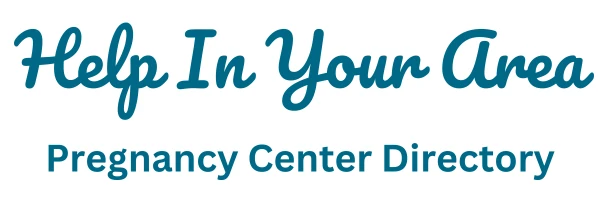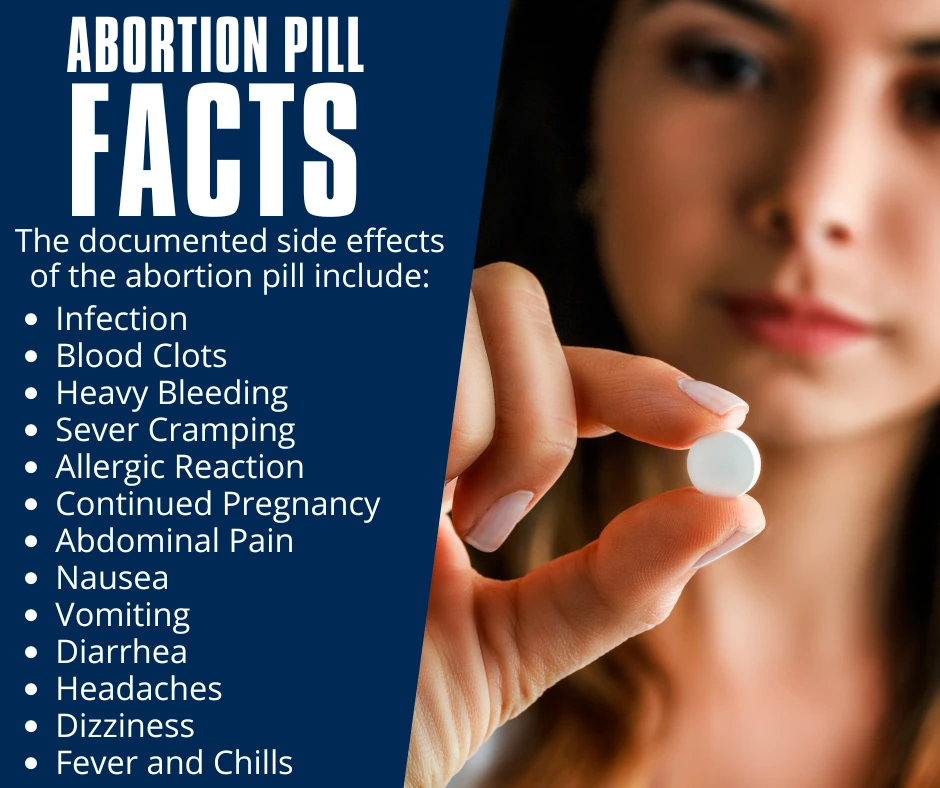
West Virginia Abortion Pill Information

Abortion Pill
The abortion pill is a medical abortion. This type of abortion uses two drugs. The first medication (Mifepristone ) blocks the progesterone hormone which is needed for pregnancy to continue. When used together with the second medication (Misoprostol), it will end an early pregnancy (70 days or less since the first day of the last menstrual period or 10 wks LMP) and is considered unsafe beyond that time.
The pill, mifepristone, causes an abortion by blocking the hormone progesterone, which is necessary for pregnancy to continue. The abortion pill is administered in three doses, along with another drug, misoprostol, and typically requires three clinic visits.
On the first visit, the woman takes three mifepristone abortion pills, which results in the death of the fetus.
On Day 3, she takes the second abortion pill, misoprostol, which will cause cramping to expel the fetus.
A follow-up visit is required two weeks after taking the abortion pill to ensure that the pregnancy has terminated. If an ultrasound scan shows that the fetus has not been expelled, a surgical abortion will be required, typically at an additional cost.
Other names for the abortion pill (Ru486):
Mifepristone is the generic name for RU-486. In the U.S., RU486 is sold under the brand names Mifeprex® and Early Option®.
The abortion pill involves two drugs:
When taken alone, RU486 results in a complete abortion only about 60% of the time. A second drug, a prostaglandin, is given 48 hours later to increase the abortion pill’s effectiveness. The prostaglandin causes uterine contractions to help expel the fetus. Misoprostol (brand name Cytotec) is the prostaglandin used with RU-486 in the U.S.
In West Virginia the Abortion Pill is now available by mail. Before taking the Abortion Pill or any other medication, get information from a trusted source so that you understand how it works and the possible side effects.
Who Should not take the abortion pill (ru486):
The FDA advises that the Medication abortion pill (RU486) should NOT be taken if any one of the following circumstances apply:
- It has been more than 49 days since your last menstrual period began.
- You have an IUD, which must be removed before taking the pill.
- Your healthcare provider has told you that you have an ectopic pregnancy (a pregnancy outside the uterus). Note: About 2% of pregnancies are ectopic.
- You have problems with your adrenal glands (chronic adrenal failure).
- You take a medicine to thin your blood.
- You have a bleeding problem.
- You take certain steroid medications.
- You cannot return for the necessary follow-up visits (2 days and 14 days after taking RU-486).
- You cannot easily access emergency medical help, including blood transfusions and emergency resuscitation, in the 2 weeks after taking the medication abortion pill.
- You are allergic to mifepristone [RU-486], misoprostol, or medicines that contain misoprostol such as Cytotec or Arthrotec.
Adverse events and side effects of the abortion pill:
In U.S. trials of RU486/misoprostol, at least 99% of patients experienced at least one of the following medication abortion pill side effects:
- Abdominal pain (cramping) (97%)
- Nausea (67%)
- Headache (32%)
- Vomiting (34%)
- Diarrhea (23%)
- Dizziness (12%)
- Fatigue (9%)
- Back pain (9%)
- Uterine hemorrhage (7%)
- Fever (4%)
- Viral infections (4%)
- Vaginitis (4%)
- Rigors (chills/shaking)(3%)
More than one adverse event was reported for most patients. Approximately 23% of the adverse events were judged to be “severe.”
The FDA is aware of women in the United States who died from sepsis (severe illness caused by infection of the bloodstream) after medical abortion with Mifeprex and misoprostol.
Calculating the Length of Pregnancy:
Doctors calculate the length of pregnancy by counting from the first day of the last menstrual period (LMP), approximately two weeks prior to conception (fertilization). So “up to 49 days LMP” means up to 5 weeks after conception.
Understanding the details and implications of choosing the medication abortion pill is crucial for anyone considering this option. It’s important to be fully aware of the time constraints, procedure, potential side effects, and risks involved with this form of abortion. The use of RU486, coupled with misoprostol, is a significant medical decision that should be made with comprehensive knowledge and under professional medical guidance.
For those considering this option, it’s vital to consult with healthcare professionals to ensure safety and to discuss any concerns or questions you might have. It’s equally important to understand the legal and health criteria that determine eligibility for taking the medication abortion pill. Remember, this decision is not just about the immediate termination of pregnancy but also involves considering your long-term health and well-being.
If you or someone you know is facing an unplanned pregnancy and contemplating a medication abortion, consider reaching out to your local West Virginia pregnancy center for detailed information and support. Making an informed decision is essential, and it’s important to have access to all the facts and support systems available. Remember, you are not alone in this journey, and there are resources and people ready to help you through this process.
Abortion Pill Frequently Asked Questions
Question: How Much Does the Abortion Pill Cost?
Answer:
The typical cost of the abortion pill ranges from $350 to $700, and it may be even higher depending on the provider. For the information you need, determine how far along you are in your pregnancy with our complimentary ultrasound services.
Question: How Can I Get the Abortion Pill?
Answer: You can get an abortion pill either through an abortion provider’s clinic or by an online mail source. For mail order, in most cases, a telehealth appointment is required and the medication for the abortion is sent directly to you without an in-person physical examination. A physical examination is important because it dates the pregnancy, rules out ectopic pregnancy, and determines viability (if you are at risk for miscarriage).
Question: What are “Missed Period Pills?
Answer: sed period pill is another name for the abortion pill. Some people may think it might help them psychologically if they’re unsure about abortion. Regardless of its name, you should know that it is an abortion.
West Virginia Pregnancy Centers
West Virginia pregnancy centers are located in all major cities including Charleston, Huntington, Morgantown, Parkersburg, Wheeling, Martinsburg, Weirton, Fairmont, Beckley, Clarksburg, and even many smaller cities.
Most West Virginia pregnancy centers listed offer free and confidential services including medical grade pregnancy tests and ultrasound exams.
Abel Crisis Pregnancy Center
201 Sylvia Ln
Bluefield, WV 24701
304-325-2000
Center for Pregnancy Care
8 Meadow St.
Buckhannon, WV 26201
304-473-1122
Crossroads PCC
2010 Quarrier Street
Charleston, WV 25311
304-344-4511
Women's Choice PRC
504 Washington St. West
Charleston, WV 25339
304-346-9779
Life Choices Inc.
117 S. 4th Street
Clarksburg, WV 26301
304-622-1953
Pregnancy Resource Center
36 Mountain Park Drive
Fairmont, WV 26554
304-363-0003
Central WV Center for Pregnancy Care
56 Beall Drive
Gassaway, WV 266245
304-364-8843
Central WV Center for Pregnancy Care
3071 Appalachian HWY
Harman, WV 26270
304-227-3614
A New Beginning PRC
925 8th Street
Huntington, WV 25701
304-697-0411
The James Isaac House Pregnancy Center
97 N. Davis St
Keyser, WV 26726
304-788-0707
The James Isaac House Pregnancy Center
312 E. Main Street
Kingwood, WV 26537
304-329-1132
Compass Women’s Center
283 Don Knotts Blvd.
Morgantown, WV 26501
304-212-2131
Women's Care Center
3007 Dudley Ave.
Parkersburg, WV 26104
304-485-7113
Central WV Center for Pregnancy Care
241 2nd Street
Parons, WV 26287
304-642-8496
The James Isaac House Pregnancy Center
65 Spring Ave, Unit B
Petersburg, WV 26847
304-257-2402
Heartbeat of the Valley
58 Mission Way, Ste 100
Scott Depot, WV 25560
681-235-2097
Central WV Center for Pregnancy Care
St. Thomas ED Building
Thomas, WV 26292
304-46304388
Wellspring Pregnancy Center
98 Parkway Drive
Williamson, WV 25661
304-78409721
ABBA CARE
200 Weems Lane
Winchester, WV 22601
540-665-9660
West Virginia, located in the Appalachian region of the United States, is known for its rugged terrain, rich natural resources, and strong cultural heritage. Morgantown and Huntington are major cities. West Virginia features a diverse landscape that includes the Appalachian Mountains, dense forests, and numerous rivers, with a climate characterized by humid summers and cold winters. As of 2022, the population of West Virginia is projected to be 1.775 million. Universities in West Virginia include: West Virginia University, Marshall University, and many other colleges and universities. The capital is Charleston, West Virginia.
Frequently Asked Questions
Question: Do I need an appointment?
Answer: Walk-ins are welcome. However, it is best to make an appointment to minimize your office wait time.
Question: What is the cost?
Answer: All services are free and confidential.
Question: What should I expect when I come for my visit?
Answer: Upon your arrival, a friendly receptionist will guide you to meet your client advocate. This advocate will offer you a judgment-free space to talk, followed by essential information and a pregnancy test. In the event of a positive test result, a dedicated medical professional will perform a limited ultrasound to verify the pregnancy's viability and estimate the age of the fetus.
Question: How long after sex does it take for a pregnancy test to work and how accurate is the test?
Answer: Pregnancy tests can be performed 7 to 10 days after conception. A client with a negative result may be invited to return within 2 weeks for a repeat test if she has not had her period.
If you have taken a home pregnancy test, you may want to confirm results with a laboratory-quality test at your local pregnancy center. These pregnancy tests detect HCg levels within 7 to 10 after conception.
Question: Will you tell anyone about my visit?
Answer: Pregnancy centers maintain a rigorous privacy and confidentiality policy. Clients' information is safeguarded against unauthorized disclosure, respecting their right to privacy, except in instances mandated by law. This includes situations necessary for public health, preventing harm to the client or others, or in specific circumstances where the use or disclosure of information is justified without prior consent, such as in cases of abuse reporting or suicide/homicide prevention.
Question: When should I schedule an appointment?
Answer: High-quality, medical-grade pregnancy tests are capable of detecting pregnancy from the first day after your initial missed period. We advise scheduling an appointment if you've missed a period, have any queries related to pregnancy, or suspect that you might be pregnant.
Question: How far along do I have to be to get a free ultrasound?
Answer: After an initial consultation with a client advocate, many pregnancy centers offer on-site ultrasound scans. These limited ultrasounds are conducted by a licensed nurse sonographer or a registered diagnostic medical sonographer (RDMS) and are subsequently reviewed by a licensed physician. The purpose of an ultrasound is to confirm the viability of the pregnancy and to establish the gestational age.
Question: I already know I'm pregnant and I want an abortion, what's next?
Answer: It is advisable to have an ultrasound to confirm the viability of your pregnancy and to ensure it is located within the uterus, as 20% to 25% of pregnancies end in miscarriage. Moreover, the ultrasound helps in determining the stage of your pregnancy, which is essential in making an informed decision about the type of abortion procedure you may consider. Many pregnancy centers offer a limited ultrasound free of charge.








